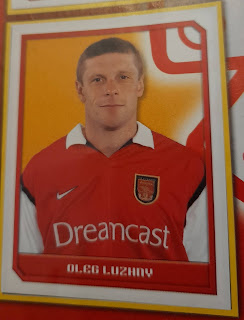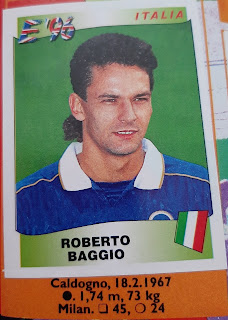14: Oleg Luzhny, Arsenal, Merlin’s F.A. Premier League 2000, Millennium Edition Sticker Collection
When an artist or band has been around for a number of years it has to be a tough balance between playing the tracks that earned you a legion of fans and treating said adoring public to some deep cuts from your new album. One of the many highlights of seeing Bruce Springsteen and the E Street Band back in 2016 was the part of the set where The Boss wandered out into the crowd to select from the array of signs requesting songs. By no means am I comparing us here at A Sticker’s Worth 500 Words to New Jersey’s finest but we’re always happy to deviate from the experimental new tracks to bang out some old favourites for those patient enough to read these posts. James Lasowski, this one’s for you.
Ahead of the recent European Championships all of the nations involved unveiled a range of snazzy new kits in the hope they would both encourage those donning them to tournament glory and swell the coffers of their football associations. Some, like debutants Finland and North Macedonia’s efforts, made excellent use of the nations’ flags. Others, like England’s home and all of those represented by Puma’s aways, were just awful. The prize for the most attention grabbing though has to go to Ukraine. In terms of design it was the standard yellow with blue trim colour scheme but a closer look revealed an outline of the map of the country. So far, so innocuous until you realise the map included Russian-annexed Crimea and the separatist controlled regions of Donetsk and Luhansk.
Even at its most stretched the 500 word limit would not be enough to fully explore the complicated relationship between Ukraine and Russia but, to briefly summarise, it’s been at the more fractious end in recent years with recent Russian expansionism bringing back memories of the Soviet Union and Russian Empire. In the Soviet days Russia’s largest neighbour to the west was a goldmine for sporting talent with Dynamo Kyiv providing over half of the USSR’s squad for the 1988 European Championships. A year later another Dynamo player made his debut for the Soviets and earned a total of eight caps to help them qualify for Italia ’90. Injury ruled him out of the tournament and by the time he had recovered the USSR had been disbanded. Luckily for Oleg Luzhny the swift formation of the Ukraine national team allowed him to win a further 52 international caps, a record 39 of them as captain, and despite falling at the play-off stages of qualification for three major tournaments his uncomplicated defending earned him a place in the nation’s ‘Team of the Century’.
Luzhny’s leadership skills were instrumental to Dynamo Kyiv’s domination of Ukranian football in the 1990s as he helped them to seven consecutive titles. A gifted Kyiv side featuring Andriy Shevchenko and Sergei Rebrov announced themselves on the continental stage with a run to the semi-finals of the 1998/99 Champions League with impressive wins over Arsenal, Panathinaikos and reigning champions Real Madrid. Luzhny skippered the side in the quarter-final victory over Madrid and although they fell to eventual runners-up Bayern Munich his performances drew several admirers from across Europe’s elite. In particular his ability to keep the likes of Marc Overmars and Dennis Bergkamp quiet during Dynamo’s clashes with reigning Premier League champions Arsenal led to Arsene Wenger splashing out £2.3m to bring the defender to North London ahead of the 1999/2000 season.
Initially signed as cover for Gunners’ stalwart Lee Dixon the Ukrainian clocked up 31 appearances in his first season at Highbury but the emergence of future ‘Invincible’ Lauren limited Luzhny’s game time during his four seasons with the club. Nevertheless he did enough to earn a Premier League winner’s medal in 2001/02 and picked up an FA Cup gong in his last appearance for the club in 2003. Despite unfairly being presented as one of Wenger’s worst signings Luzhny’s versatility and experience saw him play over a hundred games for the Gunners before moving on to newly promoted Wolverhampton Wanderers in the summer of 2003. Now 35 he made only ten appearances in all competitions for Wolves during their relegation campaign and was released by the club in 2004. A short spell as player-manager of FK Venta in Latvia followed in 2005 before he hung up his boots in the same year after the club fell into financial difficulties. It is little surprise that Luzhny slipped into full time coaching and he served as assistant manager at former club Dynamo Kyiv between the years 2006 and 2012 stepping in as interim manager on two occasions. After short spells in the hot seat at Tavriya Simferopol and Karpaty Lviv he returned to Dynamo as second in command in 2017.
It’s easy to dismiss Luzhny as a bit part player in Arsenal’s most recent period of success but this overlooks his incredible success both domestically and internationally back in Ukraine. I have to confess I didn’t know too much about him until I got asked to do this particular post and my main memory of Oleg Luzhny was that there was a lad at school a few years below me who was the spit of him. It just goes to show that you never stop learning. If anyone else fancies giving us all an education let us know.





Comments
Post a Comment